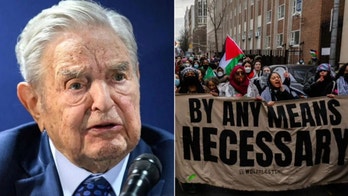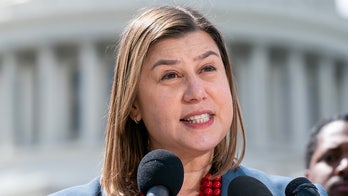CBO Predicts 2012 Deficit at $1.08T
FBN’s Peter Barnes breaks down the latest reports from the Congressional Budget Office.
The United States is headed for a fourth straight year with a $1 trillion-plus budget deficit, congressional forecasters said on Tuesday, giving Republicans ammunition to hammer President Barack Obama's spending record in November's elections.
The non-partisan Congressional Budget Office said the fiscal 2012 deficit would rise to $1.079 trillion from its previous estimate of $973 billion made last August. If Congress extends payroll tax cuts through year-end, as expected, deficits would likely rise by another $100 billion through December.
The CBO report is the opening salvo in the 2012 debate over the appropriate size of the federal government in coming years and whether the wealthy should shoulder more of the burden in fixing a fiscal mess highlighted by a national debt that has topped $15 trillion and is racing higher.
Republicans called the CBO figures a "harsh indictment" of Obama's economic policies. The president is most vulnerable on the economy, with polls consistently showing Americans unhappy with his economic stewardship since he took office in 2009.
The latest CBO analysis was particularly tricky.
In preparing its forecast, CBO had to speculate on how some big-ticket items will be handled in the future , including the 2001 and 2003 across-the-board tax rate reductions enacted by former President George W. Bush that are due to expire on Dec. 31.
As a result, some of the deficit and economic forecasts could vary significantly.
Further complicating the U.S. fiscal situation is that demands on the federal government will get worse as Obama's 2010 law to overhaul the healthcare system goes into effect and more and more elderly Americans qualify for expensive Social Security retirement and Medicare healthcare programs.
Against that backdrop, Democrats and Republicans are expected to mostly tread water on major decisions, leaving voters to decide in November whether the main focus in 2013 should be continuing to downsize government spending - as lawmakers tied to the conservative Tea Party movement have insisted - or to also revamp the tax code in a way that raises rates and closes loopholes for the rich.
Besides providing estimates on the country's budget and economic profile, the new CBO forecast is important because it provides the official numbers lawmakers will rely on as they write next year's budget.
Obama has said he wants to continue the Bush tax cuts for the middle class while ending them for upper-tier earners. Republicans oppose any rate hikes, while saying they want to reform the entire tax code and lower top rates.
November's presidential and congressional elections likely will determine which path Congress takes.
The CBO report, with its estimate of continued high unemployment through 2013, has re-ignited a debate in Congress over fiscal policy that is expected to rage throughout the election year.
In a blog, CBO Director Douglas Elmendorf noted the agency expects U.S. unemployment to remain above 8 percent this year and in 2013, but he added that should change after 2013 as economic growth picked up, he said. The unemployment rate will gradually decline to around 7 percent by the end of 2015 before dropping to near 5.5 percent by the end of 2017, Elmendorf said. The current national jobless rate is 8.5 percent.
AGREEMENT ON DEFICIT THREAT
Senate Budget Committee Chairman Kent Conrad, a Democrat, said the report "demonstrates that we must do much more to put the nation's long-term budget outlook on a sustainable path." Conrad has been calling for about $4 trillion in deficit-reduction over 10 years.
"Republicans must be willing to put revenue on the table and accept a tax code where everyone, including the wealthiest, pays their fair share," Conrad added.
House of Representatives Budget Committee Chairman Paul Ryan, a Republican, noted "four straight years of trillion-dollar deficits" and "no credible plan to lift the crushing burden of debt" that has grown during Obama's presidency.
Obama proposed a $4 trillion deficit-reduction plan last September but it stalled amid partisan bickering on Capitol Hill. He plans to revive it when he proposes his 2013 budget on Feb. 6, White House officials have said.
The CBO forecast, which is based on current law and assumes that Bush-era tax cuts expire at the end of 2012, shows the deficit falling to about $585 billion for fiscal 2013. That figure was also slightly above the August forecast.
Over the next decade under this scenario - considered by many political observers to be unrealistic - deficits would shrink back to a sustainable average of 1.5 percent of U.S. gross domestic product over the next decade - down from about 7.0 percent in fiscal 2012, which ends Sept. 30.
The deficit for the current fiscal year will stay above $1 trillion mostly due to low revenues from corporations, a CBO official said. The agency assumed a conservative U.S. economic growth rate of 2 percent for fiscal 2012, but noted that this slows considerably in fiscal 2013 on the assumption of sharply higher taxes if the Bush-era tax cuts are allowed to expire .
The U.S. posted $1.3 trillion deficits in each of the past two years after a record $1.4 trillion deficit in fiscal 2009, Obama's first year in office.
The report could feed into a central theme of the Republican election strategy to recapture the White House and Senate. They plan to portray Obama as responsible for a spending binge that has seen U.S. deficits and debt surging to record levels.
The Obama administration counters that it inherited an economy in free-fall and the outlays were necessary to prevent the 2007-09 recession from becoming another Great Depression.
Posturing over the budget will intensify in coming weeks. Obama is set to unveil his spending wish-list on Feb. 13, and is expected to use the event as an opportunity to press his case for a higher taxes on the wealthy and continued lower taxes on the middle class.





